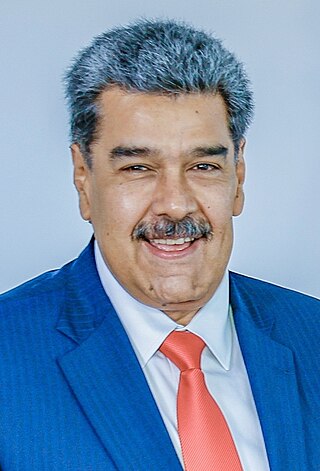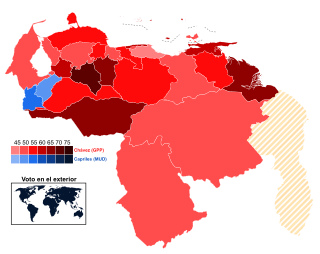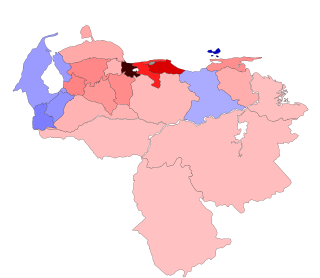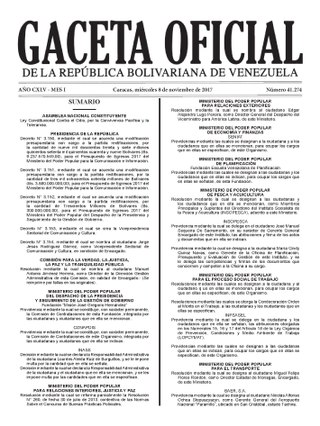Related Research Articles

The Supreme Justice Tribunal is the highest court of law in the Bolivarian Republic of Venezuela and is the head of the judicial branch. As the independence of the Venezuelan judiciary under the regime of Nicolás Maduro is questioned, there have recently been many disputes as to whether this court is legitimate.

Nicolás Maduro Moros is a Venezuelan politician who has served as the 53rd president of Venezuela since 2013. Previously, he was the 24th vice president of Venezuela from 2012 to 2013, the minister of foreign affairs from 2006 to 2012, and the 3rd president of the National Assembly of Venezuela from 2005 to 2006.

Presidential elections were held in Venezuela on 7 October 2012 to choose a president for a six-year term beginning in January 2013.

Presidential elections were held in Venezuela on 14 April 2013 following the death of President Hugo Chávez on 5 March 2013. Nicolás Maduro—who had assumed the role of acting president since Chávez's death—was declared winner with a narrow victory over his opponent Henrique Capriles, the Governor of Miranda. Capriles had run in the previous election less than a year before, losing to Chávez by an 11-point margin. This time the margin of victory was much smaller, and thus became the closest presidential election of the country since the 1968 election.

Juan Requesens Martínez is a deputy of the Venezuelan National Assembly, elected in 2015 and sworn in on 5 January 2016. He was a student leader at the Central University of Venezuela (UCV), and a leader of student opposition protesters during the 2014 Venezuelan protests. He led marches opposing the Government of Venezuela under President Nicolás Maduro, seeking "to turn the student rebellion into a broader social movement".

Parliamentary elections were held in Venezuela on 6 December 2015 to elect the 164 deputies and three indigenous representatives of the National Assembly. They were the fourth parliamentary elections to take place after the 1999 constitution, which abolished the bicameral system in favour of a unicameral parliament, and the first to take place after the death of President Hugo Chávez. Despite predictions from the opposition of a possible last-minute cancellation, the elections took place as scheduled, with the majority of polls showing the Democratic Unity Roundtable (MUD) holding a wide lead over the ruling United Socialist Party of Venezuela (PSUV) and its wider alliance, the Great Patriotic Pole (GPP).

Presidential elections were held in Venezuela on 20 May 2018, with incumbent Nicolás Maduro being declared re-elected for a second six-year term. The original electoral date was scheduled for December 2018 but was subsequently pulled ahead to 22 April before being pushed back to 20 May. Some analysts described the poll as a sham election, as many prominent opposition parties had been barred from participating in it. The elections had the lowest voter turnout in Venezuela's democratic era.

Regional elections were held in Venezuela on 15 October 2017 to elect the executive position of all 23 federal entities. This marked the first state executive election not held on the same date as elections for state legislatures, and the second separate from municipal elections. They were the 9th regional elections held in Venezuela since 1989.

A referendum was held in Venezuela on 16 July 2017. The referendum was called by the National Assembly in response to the constitutional crisis and President Nicolás Maduro's plans for a Constituent Assembly. The referendum was an act of civil disobedience in the context of the application of Articles 333 and 350 of the Venezuelan constitution, with the articles calling for Venezuelans to "disown any regime ... that violates democratic values", especially since the National Electoral Council and the Supreme Tribunal of Justice were not recognized in the referendum. The opposition Democratic Unity Roundtable (MUD) announced that there would be 2,030 areas for the popular consultation nationwide to serve more than 19 million voters.
Parliamentary elections were held in Venezuela on 6 December 2020. Aside from the 167 deputies of the National Assembly who are eligible to be re-elected, the new National Electoral Council president announced that the assembly would increase by 110 seats, for a total of 277 deputies to be elected.

Juan Requesens, a deputy of the Venezuelan National Assembly, was arrested as a suspect in the Caracas drone attack, an alleged assassination plot on the Venezuelan President Nicolás Maduro. The circumstances of his arrest and detention are controversial, and irregularities surround the legal proceedings. Requesens was imprisoned in El Helicoide from his arrest on 7 August 2018, with allegations of torture to coerce a confession, and delays impeding the legal process and hearings until his release on 28 August 2020.

Juan Gerardo Antonio Guaidó Márquez is a Venezuelan opposition politician. He belonged to the social-democratic party Popular Will, and was a federal deputy to the National Assembly representing the state of Vargas.

The second inauguration of Nicolás Maduro as President of Venezuela took place on Thursday, 10 January 2019. The inauguration involved the swearing-in of Nicolás Maduro for his second term, and, especially within the context of Maduro's election, has been controversial and contested by various figures and organizations.

During the Venezuelan presidential crisis concerning the legitimate President of Venezuela, reactions and responses to the crisis were greatly divided.
There has been censorship and media control during Venezuelan presidential crisis between 2019 and January 2023.
Gilber Caro is a Venezuelan politician, activist and thrice political prisoner.

Presidential elections were held in Venezuela on 28 July 2024 to choose a president for a six-year term beginning on 10 January 2025. The election was politically contentious, with international monitors calling it neither free nor fair, citing the incumbent Maduro administration having controlled most institutions and repressed the political opposition before, during, and after the election. Widely viewed as having won the election, former diplomat Edmundo González Urrutia fled to asylum in Spain amid repression of dissent and a national and international political crisis that resulted when Venezuelan electoral authorities announced—without presenting any evidence—that Nicolás Maduro won.
Great Mission Housing Venezuela is a program of the Venezuelan government Bolivarian missions to provide housing for people who live in precarious conditions. The program was launched by the Hugo Chávez administration in 2011 and planned to build 350,000 houses by the end of 2012. Between 2011 and 2017 the Venezuelan government built 1.3 million new homes as part the GMVV programme and in July 2023, Nicolás Maduro announced that the program had delivered 4.6 million houses.

The Constitutional Law Against Hatred, for Peaceful Coexistence and Tolerance, also known simply as the Law Against Hatred, is a law passed unanimously by the Venezuelan Constituent National Assembly and published in Gaceta Oficial 41,274 on 8 November 2017.

The COVID-19 pandemic in Venezuela was a part of the worldwide pandemic of coronavirus disease 2019 caused by severe acute respiratory syndrome coronavirus 2. The first two cases in Venezuela were confirmed on 13 March 2020; the first death was reported on 26 March. However, the first record of a patient claiming to have symptoms of coronavirus disease dates back to 29 February 2020, with government officials suspecting that the first person carrying the virus could have entered the country as early as 25 February.
References
- ↑ Luhnow, David (19 March 2019). "Maduro loses grip on Venezuela's poor, a vital source of his power". Wall Street Journal. Archived from the original on 24 July 2019. Retrieved 31 July 2024.
- ↑ Zambrano, Reynaldo Mozo (18 April 2024). "Engañoso: Hinterlaces da 59% de posibilidad de reelección a Maduro". Efecto Cocuyo (in Spanish). Archived from the original on 31 July 2024. Retrieved 31 July 2024.
- 1 2 3 Gutiérrez, Jeanfreddy (12 June 2024). "Inconsistente: encuestadora alabada por Maduro fue creada en julio de 2023" [Inconsistent: pollster praised by Maduro was created in July 2023]. Cocuyo Chequea (Cocuyo Factcheck) (in Spanish). Efecto Cocuyo. Archived from the original on 27 June 2024. Retrieved 27 June 2024.
- ↑ "Investigación sobre oficina de Alex Saab en Moscú generó huracán de desinformación". Cazadores de Fake News (in Spanish). 26 July 2022. Retrieved 31 July 2024.
- 1 2 Rodrigues Brazon, Ana Maria (28 May 2024). "¿Nicolás Maduro o Edmundo González? La 'guerra de encuestas' por quién lidera la intención de voto en elecciones de Venezuela" [Nicolás Maduro or Edmundo González? The 'poll war' over who leads voting intentions in Venezuelan elections]. El Tiempo (in Spanish). Archived from the original on 27 June 2024. Retrieved 27 June 2024.
- 1 2 3 4 Méndez, Maryorin (2 June 2024). "Guerra de encuestas: Estos son los diez sondeos que perfilan al próximo Presidente de Venezuela" [Poll war: These are the ten polls that outline the next President of Venezuela] (in Spanish). NTN24. Archived from the original on 27 June 2024. Retrieved 27 June 2024.
- 1 2 3 4 "Seis encuestadoras sospechosas promocionan coordinadamente a Nicolás Maduro como favorito para el 28-J" [Six suspicious pollsters are promoting Nicolás Maduro as the favorite for 28 July]. Medianalisis (in Spanish). 3 July 2024. Archived from the original on 15 July 2024. Retrieved 15 July 2024.
DataViva, Ideadatos, Insight by Contrapunto, Data Política Consultores, Encuestadora Paramétrica y Mass Behavior Research
- 1 2 3 4 5 6 7 8 "La 'guerra de encuestas' se desata en Venezuela en un clima de propaganda y desinformación" [The 'poll war' breaks out in Venezuela in a climate of propaganda and disinformation]. www.lapatilla.com (in Spanish). Archived from the original on 16 July 2024. Retrieved 16 July 2024.
- 1 2 Gutiérrez, Jeanfreddy (11 July 2024). "ICS resucitó para publicar encuesta inconsistente con 56,9% para Maduro" [ICS resurrected to publish inconsistent survey with 56.9% for Maduro]. Efecto Cocuyo (in Spanish). Archived from the original on 16 July 2024. Retrieved 16 July 2024.
- ↑ Hernández López, Marcos (20 June 2024). "Se activa la guerra de encuestas" [The poll war is activated] (in Spanish). El Nacional. Archived from the original on 20 June 2024. Retrieved 27 June 2024.
- 1 2 3 Gutiérrez, Jeanfreddy (12 June 2024). "IdeaDatos le otorga 56,1% a Maduro en su tercera encuesta, repitiendo vacíos empresariales y estadísticas" [IdeaDatos gives 56.1% to Maduro in its third survey, repeating business gaps and statistics]. Cocuyo Chequea (Cocuyo Factcheck) (in Spanish). Efecto Cocuyo . Retrieved 27 June 2024.
- 1 2 Gutiérrez, Jeanfreddy (14 May 2024). "Encuestadora CMIDE 50.1 es una cuenta de memes, fútbol y poesía que borró todos sus posts anteriores" [Pollster CMIDE 50.1 is a meme, football and poetry account that deleted all its previous posts]. Cocuyo Chequea (Cocuyo Factcheck) (in Spanish). Efecto Cocuyo. Archived from the original on 27 June 2024. Retrieved 27 June 2024.
- 1 2 3 Gutiérrez, Jeanfreddy (7 May 2024). "Inconsistente: IdeaDatos anuncia primera encuesta en 4 años sin preguntas y ficha incompleta" [Inconsistent: IdeaDatos announces first survey in 4 years without questions and incomplete file]. Cocuyo Chequea (Cocuyo Factcheck) (in Spanish). Efecto Cocuyo. Archived from the original on 27 June 2024. Retrieved 27 June 2024.
- ↑ Gutiérrez, Jeanfreddy (26 June 2024). "Segunda encuesta de CMIDE 50.1, que le otorga 55,8% a Maduro, no aparece en su perfil de X, que sigue lleno de memes" [Second survey by CMIDE 50.1, which gives 55.8% to Maduro, does not appear in his X profile, which is still full of memes]. Cocuyo Chequea (Cocuyo Factcheck) (in Spanish). Efecto Cocuyo. Archived from the original on 27 June 2024. Retrieved 27 June 2024.
- ↑ Gutiérrez, Jeanfreddy (5 June 2024). "Encuesta Paramétrica: creada semana y media antes de su primer estudio de opinión" [Parametric Survey: created a week and a half before your first opinion study]. Cocuyo Chequea (Cocuyo Factcheck) (in Spanish). Efecto Cocuyo. Archived from the original on 27 June 2024. Retrieved 27 June 2024.
- ↑ Gutiérrez, Jeanfreddy (1 July 2024). "Global Census, cuenta de X usada para promocionar podcast de Maduro, se convirtió en encuestadora" [Global Census, X account used to promote Maduro's podcast, became a pollster]. Cocuyo Chequea (Cocuyo Factcheck) (in Spanish). Efecto Cocuyo. Archived from the original on 7 July 2024. Retrieved 7 July 2024.
- 1 2 Gutiérrez, Jeanfreddy (3 July 2024). "IMC Orientación creó su web dos días antes de su primera encuesta, que le da 45% a Maduro" [IMC Orientación created its website two days before its first survey, which gives 45% to Maduro]. Efecto Cocuyo (in Spanish). Archived from the original on 16 July 2024. Retrieved 16 July 2024.